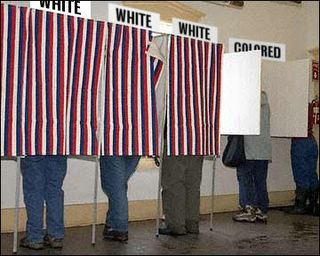

In this way and that I tried to save the old pail
Since the bamboo strip was weakening, about to break
Until at last the bottom fell out.
No more water in the pail!
No more moon in the water!
---Chiyono
I want to go soon and live away by the pond, where I shall hear only the wind whispering among the reeds. It will be a success if I shall have left myself behind.
---Henry David Thoreau
Since the house is on fire, let us warm ourselves.
---Italian proverb
When I read Greg Palast's column in the UK Guardian from Friday, and featured yesterday by TruthOut, I hesitated to get excited about it. Palast's stuff invariably is upsetting, but I sense a lot of resentment fueling him and also somehow his opinions just don't seem to catch fire. Maybe it's the "conspiracy" of the mainstream media that keeps other reporters and editorial writers from going near his theories. At any rate this time his article is titled "Democracy In Chains" and begins~~~
"Don't kid yourself: the Republican party's decision yesterday to 'delay' the renewal of the Voting Rights Act has not a darn thing to do with objections of the Republican's white sheets caucus.
Complaints by a couple of good ol' boys to legislation have never stopped the GOP leadership from rolling over dissenters.This is a strategic stall that is meant to decriminalise the Republican party's new game of challenging voters of colour by the hundreds of thousands."
http://commentisfree.guardian.co.uk/greg_palast/2006/06/voting_rights_act_nailed_to_bu.html
The first comment in the massive thread that erupted from the essay is by someone known as MisterD~~~
"This article conflates about five different issues in order to make the false claim that the Republicans are trying to deny citizens the right to vote. They are not. They are just trying to stop the massive vote fraud and ballot box stuffing the Democrats attempt at every election.
This is a poorly researched and poorly reasoned efort to smear Republicans as bigots. Like all of Palast's writing, it is designed to enflame the already feverish minds of the ignorant."
Hmmm, I decided to think it over for a while before running with Greg's ball. My connection with the Civil Rights Movement goes back a long way. Somehow I became a jazz fan as soon as I crossed the threshold into adolescence. (My parents thought I'd grow out of it.) You don't spend much time in the history of that music before you hear stories involving racial discrimination. So by the time I was in college and heard about a few other young people protesting segregation at Woolworth's lunch counters, I joined up. In the summer of 1961, I went to Chicago to train for Freedom Rides whose goal was shipping busloads of people into the South to encourage and help folks register to vote. These were states where poll taxes and literacy tests turned away thousands. The Voting Rights Act of 1965 was meant to remove these obstacles.
Lulled into a kind of complacency of victory and set rather at a distance by black backlash that was going on then, I didn't think about voting rights again until I heard about problems in Florida in 2000, and closer to home here in 2004 Ohio. Those of us who cried Foul around those elections generally have been ridiculed off the map for the same number of years it took to see progress in civil rights back in the '60s. Conspiracy theories just make you crazy, so why not give it up? Now comes Palast tying together election fraud and the Republican concerns about renewing the Voting Rights Act. Could he be right? Are Republicans testing the waters to see if anyone in America still is awake at all?
Pessimistically I typed "Voting Rights Act" in Google NewsSearch...and felt my jaw drop when pages of articles and editorials came up. It looks like every newspaper in the country has commented over the weekend on what Republicans are trying to do. More astonishing, most of them seem to see the same threat Palast sees. The most vocal of all are in the very states the legislation singles out as requiring special attention.
In Houston~~~
"The 1965 Voting Rights Act, much of which is permanent, choked off the Jim Crow laws that kept minorities from voting.e 1965 Voting Rights Act, much of which is permanent, choked off the Jim Crow laws that kept minorities from voting.
Section 5, which is up for renewal, made states with histories of voter discrimination get federal 'preclearance' for any changes in their voting law. Texas is one of those states.
There was good reason to subject Texas to federal review. Civil rights lawyers would wrestle down one assault on rights — a poll tax, or a literacy rule, or a morals test — only to see Dixiecrats dream up a new one.
Section 5 switched the burden of defending voter rights from civil rights workers to the federal government. Today, the rule is especially useful at the local level, where council members and others might not be sensitive to a law or procedure that would have an adverse impact on racial minorities.
When the Voting Rights Act was passed, it was easy to spot attempts to disenfranchise minority voters. Most took place in the South. In recent years, though, attacks on voter rights and access to polling places have erupted all over the map. In the last presidential election, some of the most egregious violations occurred in Florida and Ohio — states largely exempt from Section 5."
http://www.chron.com/disp/story.mpl/editorial/4001127.html
Alabama~~~
"What had happened was that a group of representatives from the South protested that, under the renewal, their states would still be required to have voting rule changes 'pre-cleared' by the Justice Department despite the improvements made since the act was originally passed.
They were joined by other Republicans who wanted to remove from the act the provision that requires ballots to be printed in languages other than English in states and counties where there are large numbers of non-English speakers.
Whatever the merits of the arguments for changes in the act, the bottom line is that a group of Red State Republicans, representing the heartland the GOP has captured and hopes to hold, have undermined their party’s hope to attract black and Hispanic voters in the upcoming election."
http://www.annistonstar.com/opinion/2006/as-editorials-0626-editorial-6f23s5543.htm
Georgia~~~
"For years, Southernors have insisted that the VRA is outdated, that the ills addressed by the act have been corrected. To a degree, this is a good argument. But it's not good enough. Real gains have been made, but there remain indications that, given the opportunity, political factions would pass laws that could present roadblocks to minority voting. Some cite Georgia's recently approved voter photo ID law, which could disenfranchise the poor and elderly, as the most blatant recent example.
One might also point out that just because the VRA has been successful, this is no reason to do away with it. Human nature being what it is, we can see no reason to let Section 5 expire because it works. In fact, that it works so well presents a solid argument for keeping it intact."
http://www.macon.com/mld/macon/news/opinion/14889907.htm
From Chicago yesterday, Clarence Page reviews voting rights violations taken to court in just the past few years~~~
http://www.chicagotribune.com/news/columnists/chi-0606250445jun25,1,7203155.column?coll=chi-news-col
From Atlanta, Julian Bond writes this powerful essay today~~~
"If murderers would promise not to murder again, we could eliminate all our laws against unlawful killing. No laws against murder — no murders.
That is analogous to the argument made by some Republicans against reauthorizing the 1965 Voting Rights Act.
We may have done wrong in the past, they say, but we won't in the future. So we can now eliminate the most effective civil rights law ever passed.
The act doesn't expire until September 2007, but a bipartisan coalition in Congress had pledged renewal this year. Now that effort has been derailed. Leading the train wreck has been U.S. Rep. Lynn Westmoreland (R-Ga.). He wants to radically alter Section 5 of the act, which requires federal permission to change voting rules in nine states.
The 1965 Voting Rights Act initially focused on six states where blacks had been systematically denied the right to vote — Alabama, Georgia, Louisiana, Mississippi, South Carolina and Virginia. Three more states — Arizona, Texas and Alaska — were added 10 years later to protect language minorities.
'The pre-clearance portions of the Voting Rights Act should apply to all states, or no states,' Westmoreland argues. 'Singling out certain states for special scrutiny no longer makes sense.'
But 'all states' don't have the history of the six originally covered by the act, including Westmoreland's Georgia.
Westmoreland knows full well that applying Section 5 to all 50 states likely will make the act unconstitutional, no doubt the outcome he wants. Singling out certain states, including Georgia, makes perfect sense.
From the end of Reconstruction forward, Georgia's white supremacist governments and private white citizens devoted considerable energy to preventing black citizens from registering to vote or casting ballots. Their tactics included murder, ballot stuffing, poll taxes, literacy tests that whites passed but most blacks failed, and wholesale intimidation.
When former Urban League Director and Georgia native Vernon Jordan testified for renewing the act in 1970, he said Georgia and other Southern states 'were the most efficient, determined and malicious in their efforts to keep black people off the registration rolls.'
In Harris County in Westmoreland's 8th Congressional District, blacks were 57 percent of the population in 1955, but no blacks were on the grand jury list, and blacks were only 2.3 percent of the trial jury list. Westmoreland's Douglas County adopted a majority vote requirement in 1968 without asking for pre-clearance when a black candidate prepared to run for office. The county was sued over this discriminatory procedure in 1975.
Since the act was last renewed in 1982, the Department of Justice has objected 80 times to proposed changes in Georgia's voting plans, finding they were discriminatory. Recently, only the Department of Justice's political appointees saved a biased Georgia voter identification law over the objections of career Justice Department lawyers. A federal court eventually struck the law down, but Georgia passed a substitute which justice's political appointees pre-cleared.
Sadly, the Southern Poverty Law Center lists 40 hate groups in Georgia today, operating from Athens to Valdosta, and ranging from the Imperial Knights of the Ku Klux Klan and Aryan Nations to the Council of Conservative Citizens and the League of the South.
Congress was justifiably proud of its bipartisan intention to renew the Voting Rights Act. The partisan objections of a few disgruntled defenders of a discredited system shouldn't be allowed to end agreement across the aisle on a law President Ronald Reagan said protected the 'crown jewel' of our democracy, the right to vote.
Westmoreland was quoted as saying about his and his colleagues' objections to the Voting Rights Act, 'A lot of it looks as if these are some old boys from the South who are trying to do away with it.'
Yup — it sure does.
We need renewal of the Voting Rights Act as is — just as we need to keep laws against murder on the books."
http://www.ajc.com/opinion/content/opinion/stories/0626edbond.html
And back to Palast~~~
"In the 2004 election, more than 3 million voters were challenged at the polls. No one had seen anything like it since the era of Jim Crow and burning crosses. In 2004, voters were told their registrations had been purged or that their addresses were 'suspect'.
Denied the right to the regular voting booths, these challenged voters were given 'provisional' ballots. More than 1m of these provisional ballots (1,090,729 of them) were tossed in the electoral dumpster uncounted.
A funny thing about those ballots: about 88% were cast by minority voters."
Robert Kennedy's article nearly 4 weeks ago and Steven Freeman's new book that I've referenced before attempt to chronicle a pattern to the election problems seen by many over the past half dozen years...particularly in Florida and Ohio. Accusations were made that particular voting blocs were disenfranchised, and the pattern described clearly favored the Republican Party. Now Republicans seem to be looking squarely into the spotlight at the scene of the crime. Is this possible? Or are we going to get a new spin that will send us back to our shrugging apathy?
Kennedy's article is here~~~
http://www.rollingstone.com/news/story/10432334/was_the_2004_election_stolen/1
and The Boston Globe has a new statement by Freeman today~~~
http://www.boston.com/news/globe/editorial_opinion/oped/articles/2006/06/26/a_call_to_investigate_the_2004_election/



